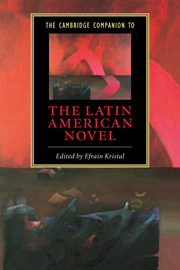8 - The Central American novel
from Part II - Heterogeneity
Published online by Cambridge University Press: 28 May 2006
Summary
The Central American novel can be traced back to José Milla (1822-82), one of Guatemala’s most revered and popular writers to this day. His novels La hija del Adelantado (“Governor’s daughter,” 1866), Los Nazarenos (“The Nazarenes,” 1867), and El Visitador (“The Inspector,” 1867) are historical romances set in the colonial era. In novels whose plots involve political intrigue, the travails of love and some fantastic elements, Milla endeavors to portray authentic Guatemalan speech, manners, and popular types. One of his notable achievements is the creation of a stock character named Juan Chapín (Juan the Guatemalan), the fictional hero of Un viaje al otro mundo (1874), a book of semi-fictional memoirs and quixotic adventures. In contrast to the engaging Juan Chapín, the figure of a vain, scatterbrained compatriot, the laughing stock of Paris, is the creation of Hermógenes Alvarado (1845-1929) in Las aventuras del gran Morajuáy los apuros de un francés (1896), considered the first novel written in El Salvador.
The Central American novel paralleled developments in the rest of Latin America, although it usually lagged behind in the latest styles and techniques. In the last thirty years of the nineteenth century historical and sentimental novels were the favorite modes. Nicaragua’s first novel, Amor y Constancia (“Love and perseverance,” 1878) by José Dolores Gámez, would today be labeled a pulp-romance, while Panama’s first novel, La verdad triunfante (“The triumphant truth,” 1879) by Gil Colunje (1831-99), is also a sentimental tale. In Costa Rica the novelistic tradition began a few years later with Manuel Argöuello, who experimented with short historical novels in Margarita, Elisa Delimar, and La trinchera (“The trench,” 1900). In Guatemala, Agustín Mencos Franco published Don Juan Núñez García (1898), a historical novel inspired by Walter Scott and Alexandre Dumas which recounts the rebellion by the Tzenal Indians in Chiapas at the beginning of the eighteenth century.
- Type
- Chapter
- Information
- The Cambridge Companion to the Latin American Novel , pp. 162 - 180Publisher: Cambridge University PressPrint publication year: 2005
- 1
- Cited by



